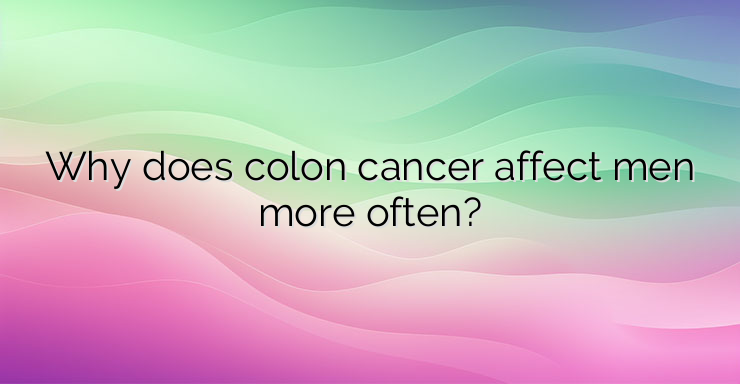What are the causes of colon cancer in men? Colon cancer is one of the most common cancers diagnosed in men every year. Colon cancer occurs in both men and women, but the disease affects men more often. As with all cancers, there are differences in how men and women are affected by the disease. In some cases, this may be related to biological differences such as anatomy or hormones. Lifestyle and health care differences can also affect how often men or women develop cancer and to what extent they get different results from treatment. Differences in dietary and lifestyle choices, as well as attitudes toward cancer screening, may contribute to the differential incidence of colon cancer in men and women. All of these factors may help explain why men have an increased risk of developing colon cancer. What are the common signs and symptoms of colon cancer? The signs and symptoms of colon cancer are the same in both men and women. However, the location of the tumor can affect some symptoms. For example, a tumor in the lower digestive tract may cause bright red blood in the stool, while a tumor that is located higher in the colon may cause tarry or black stools (melena). Although symptoms can vary slightly depending on the location of the cancer in the colon, typical symptoms of colon cancer include: Abdominal swelling, cramping, or pain; Tar-black, shiny, loose and foul-smelling stools; Blood in or on the stool; Change in habits (going to the toilet more or less often than usual); Diarrhea; Constipation; Fatigue; The constant feeling of wanting to defecate (tenesmus); Thin stools; Unwanted weight loss; Vomiting The signs and symptoms of colon cancer can be similar to those caused by other more common conditions, such as a viral or bacterial infection or hemorrhoids. That’s why it’s important to discuss any gastrointestinal problems with a doctor. Blood in the stool is never normal and should be discussed with a doctor, even when the patient has already been diagnosed with a condition such as hemorrhoids or inflammatory bowel disease. What are the differences in the symptoms of colon cancer in men? Colon cancer symptoms experienced by men may differ slightly from those experienced by women. This is because cancer in men occurs more often in the lower part of the colon (sigmoid colon) and in the rectum. In women, the cancer usually develops further up in the colon (where it is more difficult to diagnose). Cancer in the sigmoid colon or rectum can cause symptoms, such as blood in the stool or a constant feeling of needing to use the toilet. the peoplewho have these symptoms may seek medical attention early in the course of the disease. This may not be the case in people with cancer located higher in the colon. In colon cancer, early detection is important for successful treatment of the disease. Therefore, the symptoms of the more common types of colon cancer in men can lead to the cancer being detected at an earlier stage. Which means that men are slightly more likely to be diagnosed with stage I colon cancer than women. Overall, 18% of men were diagnosed with stage I cancer (compared to 16% of women), 27% with stage II cancer and 31% with stage III cancer. Even when diagnosed at an earlier stage, colon cancer is still more deadly in men than in women. One reason for this is differences in hormones, as female hormones may offer some protection when it comes to colon cancer. Lifestyle choices, including a pro-inflammatory diet (junk food), obesity, and lack of exercise also play a role in cancer. These factors negatively affect men more than women when it comes to increasing the risk of colon cancer. References: 1. Macrae FA. Colorectal cancer: Epidemiology, risk factors, and protective factors 2. National Cancer Institute. Cancer stat facts: Colorectal cancer 3. Koo JH, Leong RWL. Sex differences in epidemiological, clinical and pathological characteristics of colorectal cancer 4. Abancens M, Bustos V, Harvey H, McBryan J, Harvey BJ. Sexual dimorphism in colon cancer 5. Verywell Health. How Colon Cancer Is Different in MenMacrae FA. Colorectal cancer: Epidemiology, risk factors, and protective factors 2. National Cancer Institute. Cancer stat facts: Colorectal cancer 3. Koo JH, Leong RWL. Sex differences in epidemiological, clinical and pathological characteristics of colorectal cancer 4. Abancens M, Bustos V, Harvey H, McBryan J, Harvey BJ. Sexual dimorphism in colon cancer 5. Verywell Health. How Colon Cancer Is Different in MenMacrae FA. Colorectal cancer: Epidemiology, risk factors, and protective factors 2. National Cancer Institute. Cancer stat facts: Colorectal cancer 3. Koo JH, Leong RWL. Sex differences in epidemiological, clinical and pathological characteristics of colorectal cancer 4. Abancens M, Bustos V, Harvey H, McBryan J, Harvey BJ. Sexual dimorphism in colon cancer 5. Verywell Health. How Colon Cancer Is Different in Men


Leave a Reply